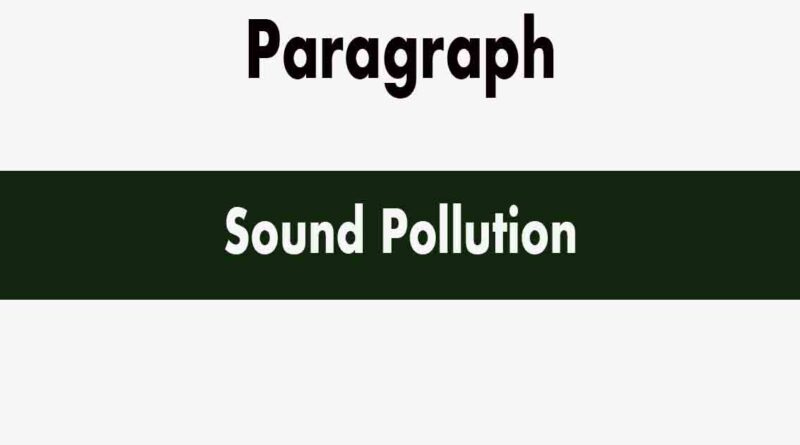Sound Pollution Paragraph
Noise pollution is pollution by disturbing sound and excessive noise. According to the UN, the normal tolerance limit for sound is 45 decibels. When the vibration of sound is at a tolerably pleasant level, it is simply called sound.
But when it is sharp and harsh to the ears, it becomes noise. It harms the activities of human life. The source of most outdoor noise is mainly machinery, transport systems, motor vehicles, planes and trains.
Poor urban planning can lead to noise pollution. In addition to industrial and residential buildings, noise pollution can occur in residential areas.
Indoor noise is caused by various machines involved in construction activities, music and entertainment equipment and some other household appliances. Noise pollution affects both physical and mental health.
Unwanted sound can damage mental health. High levels of noise can contribute to hearing loss, sleep disturbances, cardiovascular effects in humans, increased blood pressure, coronary heart disease, etc.
Many developed countries are trying to control noise pollution through careful urban planning and developing public awareness. In Holland, schools are not allowed near airports, and houses located near airports are equipped with special types of insulation to reduce the sound heard inside the building.
Paragraph:- A computer paragraph for class 7, 8, ssc and hsc
Sound Pollution Paragraph for HSC
Sound pollution, also known as noise pollution, refers to the presence of excessive or disturbing sounds in the environment that can have a negative effect on human health and well-being.
This is caused by a variety of sources, including traffic (such as road traffic, planes and trains), industrial activity, construction sites, loud music and noisy appliances.
Excessive exposure to high noise levels can lead to a number of health problems. Prolonged or continuous exposure to loud noises can cause hearing loss or damage, either temporary or permanent.
It can also contribute to stress, sleep disturbances, increased blood pressure, cardiovascular problems and reduced cognitive performance.
In addition to the impact on human health, noise pollution can also disrupt daily activities and quality of life. It can interfere with communication, making it difficult to have a conversation, focus on tasks, or enjoy a calm and quiet environment.
It can disrupt sleep patterns, leading to fatigue and reduced productivity. Noise pollution can also disturb wildlife and affect their habitat, communication and reproductive patterns.
Individuals can take steps to minimize their contribution to noise pollution. Using quieter appliances, avoiding unnecessary honking or loud music and being mindful of noise levels in public spaces can help create a calmer and more harmonious environment.
In addition, technologies that reduce noise emissions, such as quieter engines in vehicles or quieter machinery in industries, are being developed and implemented to combat noise pollution.




